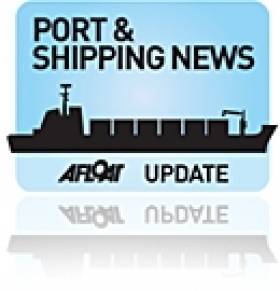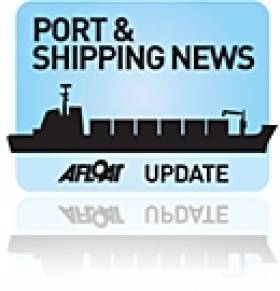Displaying items by tag: Irish Livestock to Libya
Cattle Ship ‘Express 1’ Reaches Libyan Port
#CattleShip – The recently renamed livestock-carrier Express 1 arrived today at the Libyan port of Misrata, having taken a 9 day voyage from Waterford, writes Jehan Ashmore.
As reported yesterday, the 7,087 tonnes vessel had been renamed while berthed in Waterford (Belview) port, having arrived as Al Mahmoud Express from the Mediterranean.
When loading the 2,900 cattle in Belview Terminal, they had arrived in trucks and were then transferred via a gangway and through the vessel's side loading door.
The trucks could not be driven on board via the former vehicle-carrier (built as the Autoline) which since conversion for the cattle trade, no longer has stern loading doors and outstretching ramp to quayside capability.
Livestock-Carrier to Restore Trade with Libya
#LivestocktoLibya – A livestock-carrier docked in Waterford Port yesterday, to restore the trade with Libya, which banned beef imports, following the BSE (mad cow) disease which broke out in Ireland, more than 17 years ago, writes Jehan Ashmore.
Al Mahmoud Express is believed to be operated by a Syrian shipping company. The 7,089 tonnes vessel berthed at Belview, the port's main terminal facility, downriver of the city on the Waterford Estuary. It was back in the 1990's, when the city quays last saw live-stock trading on a more regular basis.
Together the Department of Agriculture and the IFA have been working strenuously to have live cattle exported to North Africa.
IFA Livestock Director Kevin Kinsella said that cattle agents are now buying cattle for live export and are looking for coloured cattle, and continental breeds, Angus and Hereford. Mr Kinsella expressed the hope that the live trade will also resume shortly to Egypt and Lebanon.
Prior to the Panamanian flagged vessel setting sail to Ireland, officials from the Department of Agriculture carried out an inspection of the ship in Turkey, which led to some modifications.
In this first shipment to Libya, up to 2,900 live cattle are to be transported to Tripoli. It is estimated the passage time will take 10 days, with an en-route call to Ceuta, the Spanish enclave which neighbours Morocco.
The cattle kill is likely to be up by up to 150,000 this year, and with this additional outlet will help to keep upward pressure on prices.
Al Mahmoud Express, was previously a 700 capacity vehicle-carrier that regularly called to Irish ports. As the Autoline, the 1983 built vessel ran for United European Car Carriers (U.E.C.C.) and up to several years ago she included calling to Rosslare, before been sold.






























































